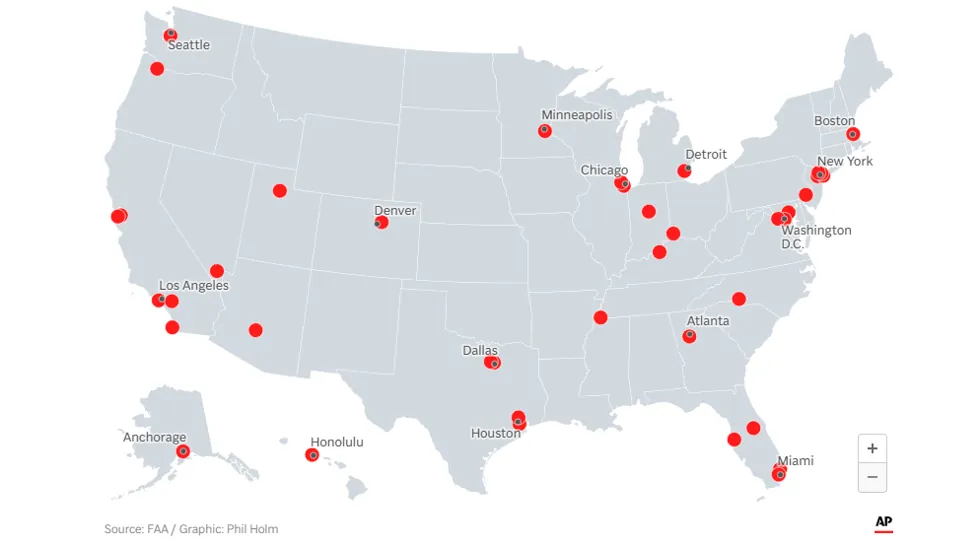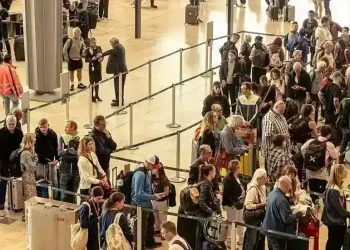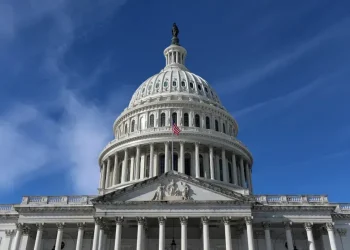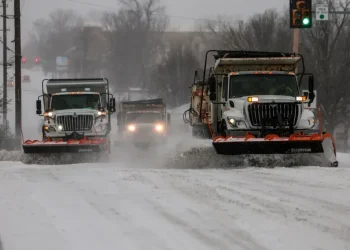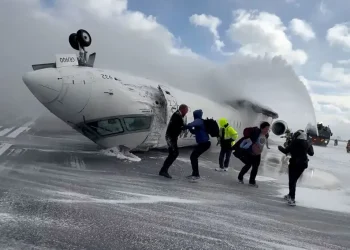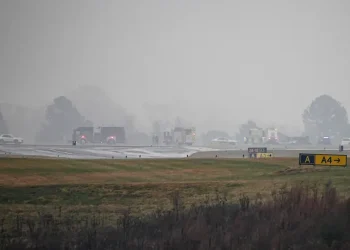U.S. Air Travel Faces Growing Turbulence as Shutdown Forces Flight Cancellations Nationwide
More than 1,000 U.S. flights were canceled Friday as airlines complied with federal orders to scale back operations during the prolonged government shutdown. The Federal Aviation Administration (FAA) has instructed carriers to reduce service at major airports due to staffing shortages among air traffic controllers who have gone unpaid for weeks. While airlines report stable weekend schedules, officials warn that disruptions could deepen if the shutdown continues.
Flight Cancellations Mount Across the Country
Thousands of travelers faced mounting frustration Friday as major U.S. airlines canceled over 1,000 flights to comply with new FAA directives. The move is intended to manage safety and operational capacity amid a growing wave of staff shortages among air traffic controllers, many of whom have missed paychecks since the government shutdown began nearly a month ago.
According to data from FlightAware, cancellations on Friday were five times higher than the day before. Reagan National Airport in Washington, D.C., saw the highest number of disruptions, with roughly 18% of its flights canceled. Major hubs in Atlanta, Denver, Dallas–Fort Worth, and Chicago O’Hare were also affected but reported smaller cutbacks of around 3%.
Transportation Secretary Sean Duffy told Fox News that if the shutdown persists and more controllers fail to report for duty after missing another paycheck, the FAA could expand the reduction from 10% of flights to as much as 20% nationwide.
Airlines Work to Rebook Passengers and Manage Schedules
Despite the cancellations, carriers stressed that most travelers are being rebooked on later flights with minimal delays. Airlines have focused the cuts on smaller regional routes to limit the impact on passengers traveling through major hubs.
Delta Air Lines said it canceled about 170 flights on Friday, while American Airlines expected to cut around 220 flights daily through Monday. Southwest Airlines trimmed approximately 120 flights the same day. Both United Airlines and American said they were able to rebook most affected travelers quickly, ensuring limited disruption for international routes.
The FAA said its order will initially reduce operations by about 4% at the busiest airports, ramping up to 10% next week as more staff shortages are confirmed.
Long Lines, Missed Connections, and Costly Alternatives
At Houston’s George Bush Intercontinental Airport, security lines stretched through the terminal before sunrise, with some travelers resorting to sitting or lying on the floor while waiting.
“It was snaking around all different parts of the regular area,” said passenger Cara Bergeron, who had flown from Houston to Atlanta. “I’ve never seen anything like that.”
Other passengers faced greater logistical challenges. Karen Soika, a Connecticut-based surgeon, discovered that her rebooked flight was departing from New York’s John F. Kennedy International Airport instead of Newark, New Jersey — forcing her to improvise. Unable to secure a rental car, she decided to drive a U-Haul truck cross-country to reach a television production in Utah.
Rental car companies like Hertz reported a noticeable increase in one-way bookings as more travelers sought ground alternatives to canceled flights.
Economic and Logistical Ripples Beyond Passenger Travel
Experts warn that the aviation slowdown could ripple through the broader economy if it continues. Nearly half of all U.S. air freight is transported in the cargo holds of passenger aircraft. Reduced flight capacity could therefore raise shipping costs and strain supply chains, said Patrick Penfield, a professor of supply chain practice at Syracuse University.
“Air travel is part of the infrastructure backbone of the American economy,” added Greg Raiff, CEO of Elevate Aviation Group. “This shutdown is going to impact everything from cargo to business travel to tourism.”
Airports are also taking measures to support federal workers. Denver International Airport has created a food pantry for unpaid employees and has requested permission from the FAA to use its revenue to help cover wages — though officials say no response has yet been received.
FAA Cites Safety and Workforce Strain
The FAA explained that the flight reductions are meant to relieve excessive pressure on air traffic controllers, many of whom have been working six-day weeks with mandatory overtime since the shutdown began. As financial stress builds, absenteeism has increased, leading to concerns about fatigue and safety oversight.
“I don’t want to see the disruption. I don’t want to see the delays,” Transportation Secretary Duffy said at a press briefing at Reagan National Airport. “But we must prioritize safety above all else.”
While the FAA has not specified how long the flight cuts will remain in place, officials say the measure will continue until operational data confirms that staffing levels and safety conditions have stabilized.
What Travelers Should Know About Their Rights
Under U.S. Department of Transportation (DOT) regulations, airlines must refund passengers whose flights are canceled if they choose not to travel. However, carriers are not legally required to provide compensation for food, lodging, or additional transportation unless the cancellation is directly within the airline’s control.
Passengers are advised to monitor flight updates closely, arrive early, and prepare backup travel options. Travel adviser Christina Schlegel from Arlington, Virginia, said she has been encouraging clients to remain calm but proactive.
“People really should be thinking, ‘What else can I do?’” she said. “Can I already research other potential flights or nearby airports? Having that information in your back pocket helps.”
Uncertain Days Ahead for U.S. Aviation
Industry analysts say airlines are facing unprecedented operational uncertainty as the government shutdown continues without a clear end date.
“The uncertainty makes it challenging for airlines to rationally plan their response and optimize flight operations,” said Kerry Tan, a professor of economics at Loyola University Maryland.
For now, U.S. carriers continue to adjust schedules daily while urging passengers to stay informed. But with federal aviation staff still unpaid and safety operations under strain, the path to full normalcy in U.S. skies remains unclear.
This article was rewritten by JournosNews.com based on verified reporting from trusted sources. The content has been independently reviewed, fact-checked, and edited for accuracy, neutrality, tone, and global readability in accordance with Google News and AdSense standards.
All opinions, quotes, or statements from contributors, experts, or sourced organizations do not necessarily reflect the views of JournosNews.com. JournosNews.com maintains full editorial independence from any external funders, sponsors, or organizations.
Stay informed with JournosNews.com — your trusted source for verified global reporting and in-depth analysis. Follow us on Google News, BlueSky, and X for real-time updates.
